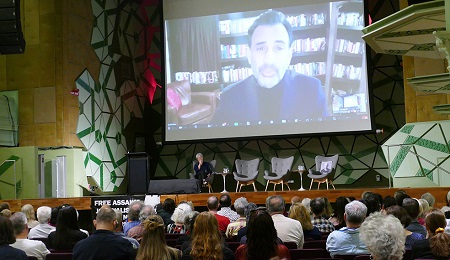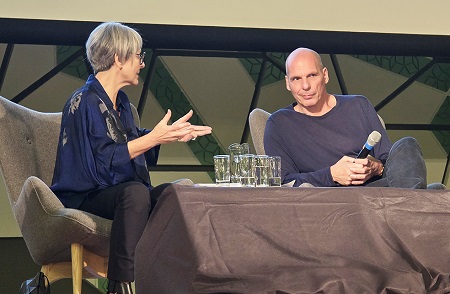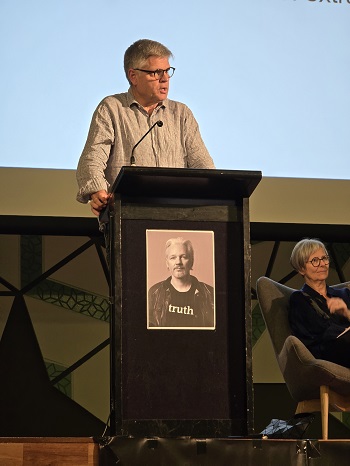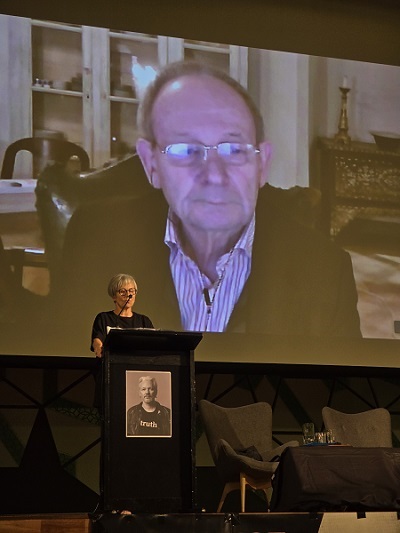Confronting a complex challenge can “serve to organise and measure the best of our energies and skills”, as JFK said when he announced America would put a man on the moon by the end of the decade. Julian Assange has not only changed the world by exposing power to truth, but because of his refusal to compromise on principle the fight to free him has catalysed a new global leadership movement critical for the survival of humanity. A slice of that movement, drawn from political figures, diplomats, historians, journalists, and everyday citizens, came together at Saturday’s Assange Epic: “Night falls in the Evening Lands”.
The German word Abendlandes—literally evening lands—translates in English as the Occident or Western World, and as all the presentations from a wide range of perspectives attested, we are witnessing its rapid decline.
Righteous rumblings
MC Mary Kostakidis, veteran Australian journalist and longtime news presenter for SBS, opened the event by discussing the horrifying genocide in Gaza, conducted with the support of Western nations. This shocking reality, however, is changing the narrative and a growing percentage of the population is no longer buying the lies portrayed by the mainstream media.
“We are living in very dark times”, declared keynote speaker Craig Mokhiber, former Director of the New York Office of the UN High Commissioner for Human Rights, “but it didn’t have to be this way”. Speaking online from New York, the international and human rights law specialist recounted the 1948 birth of the United Nations universal declaration of human rights under which all citizens are equal. But, he lamented, “this is not a world lighted by the rule of law—this is nightfall.”
Julian Assange “dared to tell the truth” to powerful Western states, and he was terrorised for doing so. Even if his appeal fails, said Mokhiber, “there is a righteous rumble building in the heart of civil society … and it is growing every day.” Ultimately, justice “cannot, and will not, be denied”.
Con Pakavakis opened the first panel on “The grievous costs of the US alliance”. An instrumental anti-Vietnam war activist who represents PEN Melbourne’s Writers for Peace, Pakavakis reviewed the fabric of lies behind the construction of the Western order, with the example of the British colonisation of Australia as a supposedly “uninhabited” nation. Describing Assange’s current torture and the lack of action by successive Australian governments, he came full circle to today’s USA and its “untouchable” attitude, expressed by the words of a senior advisor to US President George W. Bush: “We’re an empire now, and when we act, we create our own reality.”
Give us Julian!
Dr Emma Shortis, historian and senior researcher of international and security affairs with the Australia Institute, drew historical parallels to the Vietnam war—particularly US concerns over how it was perceived—to demonstrate why Assange had to be persecuted. The USA has effectively declared, she said, that Assange “made us look mighty bad and he’s going to pay for it”. She cited a 2018 article by Adam Serwer, titled “The cruelty is the point”, to explain why the UK and USA are making an example of Julian. But this treatment has led to the “first cracks” we have seen in decades in the US-Australia relationship. If we are to have a real relationship, said Shortis, Julian must be free: “We are at an inflection point for Julian, for empire, and for the alliance”. For the AUKUS sub deal to go ahead, the Australian government should say, “Give us Julian—you have to do this one thing for us!” We do not want to live in a world, she concluded, marked by cruelty, but by empathy. Independent journalist Michael West opened the second panel, “The crimes of empire and media”, with a review of the media’s failures in reporting on the Assange case. Media, like politicians, have been confused and divided on the Assange matter. “This is not an issue of personal appeal, this is a matter of global importance”, said West. “Feelings should not come into it. But, for media to foment change there needs to be three parts: media revelations and coverage which leads to public outrage, and that public outrage leads to political change. This has not happened.”
Editor and columnist with Counterpunch and The Mandarin, Dr Binoy Kampmark, noted that despite the Kafkaesque nastiness of using the Espionage Act to delegitimise publishing, WikiLeaks has oxygenated the so-called Fourth Estate across the world. The media has colluded too closely with the state, he said, but “the tide is turning”. Mary Kostakidis backed this up, citing the negative press coverage of China’s rise as an example of why the press continually needs “disrupting”.
Watching Big Brother
Yanis Varoufakis, economist, Greek political leader and former Finance Minister, provided invaluable insight into the mind of Julian Assange in his presentation, “Lessons Julian taught me”. He related Julian’s design for WikiLeaks as essentially turning a big digital mirror onto Big Brother and saying: no matter if you’re watching me, we’re watching you watching us! “Have you ever wondered how it is that WikiLeaks is still online?”, he asked the audience. Julian designed the platform to pre-emptively defeat the CIA’s best efforts to hack it, and it has stood the test of time, across the many years he has been detained.
Julian’s imprisonment shines a light on the Australian government for its inaction. Varoufakis provided examples of moments when Assange might have secured his own release if he had been willing to provide information, or make a deal. But “the man is supremely principled”, he said, and always refused to bargain.
Julian taught him, he said, how to combine fierce disagreement with comradeship. Indeed, collaboration among groups that would normally be diametrically opposed is the power of the Free Assange movement, a theme referenced by many speakers. In conclusion, Varoufakis insisted that “we need to free Julian Assange to give our kids a smidgeon of an iota of a modicum of a possibility of democracy!”
In the Q&A session, Citizens Party Research Director Robert Barwick asked Varoufakis if he had any insight into why politicians can sound so good when they are in Opposition but are always such a disappointment—like our “Disappointment in Chief” PM Albanese—when in government. Varoufakis echoed Barwick’s call for building increased political heat on all politicians in the lead up to the 2025 election. We have to put the fear of defeat into them, he said, especially in targeted marginal Labor seats. As for when they’re in government, being accused of being unpatriotic is one of the most damaging things for an MP, he pointed out, so demand they get something in return for the $368 billion they are spending on subs—namely, Julian’s release! Backing up former PM Paul Keating’s comments on AUKUS, the late PM Malcolm Fraser’s description of our “dangerous allies”, and calling for Australia to become a nonaligned nation, he concluded, “We need to get out of the US stranglehold”.
Rule of law-hypocrites
In her presentation opening panel three (“Reclaiming human rights and the rule of law”), Anne Orford, acclaimed professor of international law, detailed the significance of the charges against Julian Assange, including the fact that it was the first time the Espionage Act had been targeted at a publisher rather than individual journalist, and the decision to target a non-US citizen. The USA, which claims to bear the standard of the rules-based order, paid no mind to the fact that espionage is not a crime under international law; that as a non-citizen Julian would have no protection from the First Amendment in the US justice system; and has ignored UN judgements regarding Julian’s health. We are heading, said Orford, towards “imperial law”. Referring to a paper Julian wrote on “WikiLeaks and Empire”, she explained that the power of imperialism resides in a “disparity of information”, a theme to which Michael West had also referred, regarding the media’s fracturing of the market for information, and which would come up repeatedly in the course of the day’s proceedings.
Greg Barns, barrister and Assange campaign advisor, met Orford’s legal message from the political side, calling out the overt hypocrisy from media and politicians that are ever ready to condemn China and Russia for transgressions of the rule of law but refuse to lift a finger against the USA or UK for Assange. He joined the chorus of voices demanding Albanese “call in the favour” from Biden, and release Assange. It would have almost no political blowback on him in the USA, said Barns, and as Emma Shortis had said earlier, might even help his campaign. He also pushed the drive to meet MPs, reminding the audience that it’s the “traffic” on any given issue that impacts them. In response to a question from Noelene Isherwood, from the Australian Citizens Party, on the Dan Duggan extradition effort, Barns reiterated that unless you are being dragged out of the country by China or Iran, our government takes no notice. He returned to this during a subsequent question, raising ASIO head Mike Burgess’s allegations about a turncoat MP last week: “These are not people who believe, as they say they do, in the rule of law.”
In the panel “Striving for independence and security”, Ruth Mitchell, a Sydney neurosurgeon, Chair of the Board of International Physicians for the Prevention of Nuclear War and foundation member of International Campaign to Abolish Nuclear Weapons, Melbourne, observed that it requires “humour, hope and horror” to provoke change. In addition to providing a first-hand example of her activism in the fight against nuclear war, she related the horrific experiences of medical and journalist colleagues in Gaza and gave a run-down of Julian’s physical and psychological health.
Mitchell was followed by Joseph Camilleri, Emeritus Professor at La Trobe University and Fellow of the Academy of Social Sciences in Australia, who stressed that “we live in a transformative moment”, the “most critical moment in the history of the human species”. The WikiLeaks revelations of 2010, he said, shook the USA to the core because it exposed the country’s hypocrisy in a way that had never happened before. This is completely different to any other nation that might be exposed—say Russia or China—because no other nation but the USA has the “selfproclaimed mission to preserve freedom”. As for Australia, he added, we are “a frightened country” that feels it needs the “protection of empire”, and we need to show 100 per cent loyalty to secure this protection.
A tide of “national shame”, he said, “has descended on the evening lands.” We must ensure that Julian’s unimaginable suffering serves a purpose; the only question is, are we able to rise to the challenge? In the Q&A session he noted that shifting the population requires skill— opening people who are closed off because they are anxious, but can’t verbalise it, to new ideas via conversations occurring one-on-one, in local groups, articles, social media, through art or sport.
Revolutionary times
Headlining the final panel was Alastair Crooke, a British expert on the Middle East and Islamist movements who has worked for European Union agencies, speaking from Italy. His profound address was titled, “Soon we become a people without memory of its past; a space ghosting shapes long broken or forgotten”. Proclaiming today’s conflict between the West and the rest of humanity (the Global South) a deeply ideological affair, he said, “We are in an extended period of revolution and civil war” but strangely, half of the population is completely unaware of it. This state of “betweenness” threatens to lead to disorder and chaos, which we cannot allow.
Crooke warned of the “Balkanisation” of opinion which makes discussion (the conversations noted as crucial by Camilleri) impossible. Contradictions are regarded as dangerous rather than natural (as Julian had taught Varoufakis). He described how the twodecade post-2008 era of quantitative easing—free money—ushered in an economic and cultural shift, fostering the concentration of control over the media, the growth of social media, and big tech platforms beholden to advertisers. They are creating our opinions, fashioning the narrative with a singularity of messaging. It is a machine, turning distraction and polarisation—the economy of attention—into a financial concern.
Speaking about Gaza in response to a question from the ACP’s Robert Barwick, Crooke briefly documented a radical transformation that took place in Israel over the past year. A network of political factions that are dedicated to eliminating Palestine and destroying the Al Aqsa mosque in line with Biblical prophecy took power, leading to the unprecedented mass-protests by Israelis against Constitutional changes, but also triggering the 7 October attack, which was an attempt to change that new paradigm, he said, and it has changed it.
Julian’s father, John Shipton, concluded the conference by calling for institutions of culture to be revived to save civilisation. Citing numerous of the day’s speakers, other individuals and institutions outside the mainstream, he remarked that “the genius of a people arises within us, within men and women”, not from the powers-that-be. Creating and fostering such organic institutions of culture “strengthens the sinews of society”. This process relies on ideas “that flow up within us, mysteriously”, and on information—for which Julian constructed a new conduit. He created a “new cultural artefact within which we can alter policy, a new body of knowledge” being encultured within humanity. We see “new specks of gold”, rising up from vast quantities of ore, “becoming ingots”. Armed with that knowledge we must demand that “the executive obey the will of the people”.
Julian’s steadfastness should not be extraordinary. But in a world where it is too easy to be cynical and plead nothing can be done, it is refreshing and remoralising. Courage is contagious. It will take us all adopting Julian’s spirit, and that of his family members and advocates, to change the world, and free him.
The conference was videotaped, and we will advise where presentations will be available to view as soon as we know. Please note that quotes used in this article have not been checked against transcription.
By Elisa Barwick, Australian Alert Service, 13 February 2024











